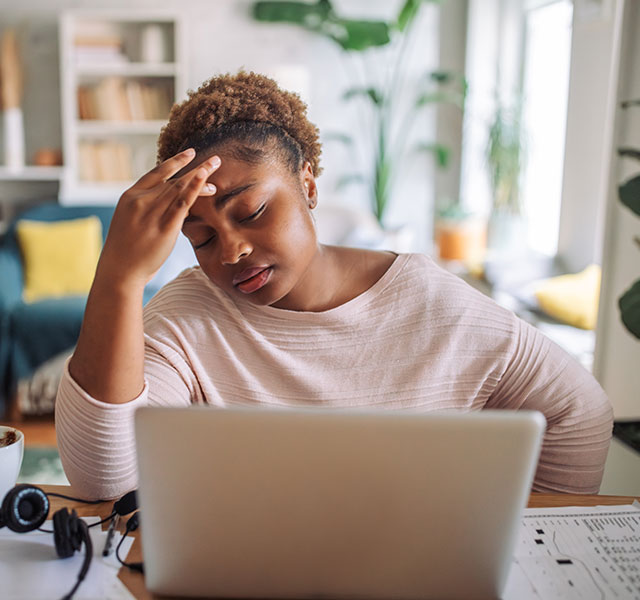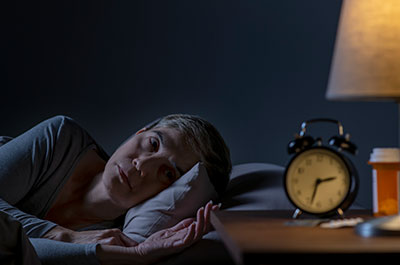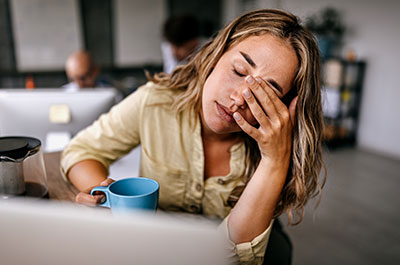With today’s 24/7 schedules managing family, friends, pets and work, feeling tired is a given. Sure, it seems obvious that lack of sleep is the most common reason for fatigue, but often, even those lucky enough to consistently log 7 to 9 hours of sleep each night still feel exhausted. When your lack of sleep isn't the source of your fatigue, other factors could be to blame.
“In many cases, patients just aren’t getting enough sleep—6 hours or less on most days,” says Nessreen Rizvi, M.D., an internal medicine physician at Henry Ford Health. “But there are a number of other things that may be at play, including nutrient deficiencies, undiagnosed infections, even your smartphone.”
10 Unexpected Reasons For Your Fatigue
To help you regain your energy and get the most out of your waking hours, Dr. Rizvi highlights 10 possible causes of fatigue — and what you can do about them:
1. You have an undiagnosed thyroid problem.
When your thyroid is sluggish, all of your body’s processes slow down. The end result: You feel tired and rundown. Unfortunately, many people who have hypothyroidism (a sluggish thyroid) don’t know it.
Do this: Ask your doctor if you could have a thyroid issue. A simple blood test will help identify whether you have the condition. Once you are able to get on medication to balance out your levels, you should see an improvement in sleep quality.
2. You have a sleep disorder.
If you wake up exhausted or feel foggy throughout the day, you could have an undiagnosed sleep disorder. For example, sleep apnea, a condition that interrupts your breathing during sleep, affects up to 29 million Americans, according to the National Sleep Foundation.
Do this: Talk to your doctor about getting a sleep evaluation. If you do have sleep apnea, a CPAP machine or alternative treatments can be used to help improve your sleep quality.
3. You have a urinary tract infection (UTI).
While pain and burning during urination may be the most common symptom of a UTI, some people may feel fatigued, too. In fact, fighting any infection can drain your energy.
Do this: If you are experiencing any other symptoms of a UTI, it is important to talk to your provider. A urine sample or blood test can help uncover a hidden infection.
4. You’re not getting enough nutrients.
Food is fuel for your body. Diets that are high on calories and short on nutrients not only zap your energy, but they may set you up for a deficiency.
Do this: Avoid processed foods and sugars as much as possible. Instead, load up on whole foods, including fruits, vegetables and whole grains instead. You may also want to ask your doctor about taking a multivitamin. Still tired? Ask your doctor to check your iron and vitamin D levels. A deficiency in either could be the reason behind your exhaustion.
5. You’re stressed.
Stress and worry can be more draining to your body than you'd ever expect. When you’re constantly in “fight or flight” mode, your heart pumps harder, your blood pressure goes up and all of your systems remain on high-alert.
Do this: Incorporate relaxation strategies throughout your day. Even if you think you are managing your stress levels well, never underestimate the power of some self-care. Go for a walk, meditate, read a “feel good” novel, practice yoga. Whatever you do, just take a few moments several times a day to do something that calms you.
6. You’re addicted to devices.
Whether you’re binging a new series on TV or stuck doom scrolling on social media, electronic devices give off “blue light” that can mess with your body’s circadian rhythm, your natural biological clock that tells you when it’s time to sleep and when it’s time to wake up. Beyond the light, devices flood your brain with constant stimulation, too.
Do this: Instead of stashing your phone on the nightstand, power it down before bed and leave it outside the bedroom. If you do plan to be on your phone or in front of the TV at night, be sure to turn them off 1-2 hours before heading to bed. Use that time instead to wind down for the night.

7. You’re dehydrated.
When you’re not drinking enough fluids, your organs have to work harder to pump blood and nutrients throughout the body.
Do this: Aim for 6 to 8 glasses of water throughout the day, and load up on water-rich fruits and vegetables, such as melon, grapes, oranges and peaches.
8. You’re not getting enough exercise.
It may seem counterintuitive, but studies show regular exercise boosts energy levels, even among people who are typically tired.
Do this: Experts recommend exercising 150 minutes each week (think: 30 minutes for at least 5 of the 7 days). But don’t worry. It doesn’t have to be intense. Even a walk around your neighborhood or on your lunch break can help you meet your weekly quota.
9. You’re getting too much caffeine.
Relying on a cup of coffee or tea to get you through the afternoon may work when you’re in your 20s and 30s, but unfortunately, as you age, your ability to digest and eliminate caffeine plummets. In general, caffeine can stay in your system for over five hours, so drinking too close to bed can result in fragmented sleep.
Do this: Stick to 200 to 300 mg of caffeine per day (about 1 to 2 cups of an 8-ounce coffee) and try to get your fix before 10 a.m.
10. You need to nix the nightcap.
Some people link alcohol with relaxation. But too much can interfere with your sleep cycle. You might fall asleep faster, but you’ll get less REM (rapid eye movement) sleep, the restorative sleep you need to operate at your best.
Do this: If you are consuming alcohol, make sure to limit yourself to one, and plan to drink it for dinner at least an hour or two before bed.
If you are still struggling with exhaustion after making lifestyle modifications, or if your fatigue is beginning to impact other aspects of your life, be sure to talk to your doctor to rule out an undiagnosed problem.
Reviewed by Dr. Nessreen Rizvi, an internal medicine physician who sees patients virtually.



